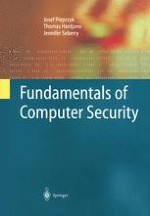2003 | OriginalPaper | Buchkapitel
Zero-Knowledge Proof Systems
verfasst von : Prof. Dr. Josef Pieprzyk, Dr. Thomas Hardjono, Prof. Dr. Jennifer Seberry
Erschienen in: Fundamentals of Computer Security
Verlag: Springer Berlin Heidelberg
Enthalten in: Professional Book Archive
Aktivieren Sie unsere intelligente Suche, um passende Fachinhalte oder Patente zu finden.
Wählen Sie Textabschnitte aus um mit Künstlicher Intelligenz passenden Patente zu finden. powered by
Markieren Sie Textabschnitte, um KI-gestützt weitere passende Inhalte zu finden. powered by
Zero-knowledge (also called minimum disclosure) proof systems are indispensable wherever there is a necessity to prove the truth of a statment without revealing anything more about it. Zero-knowledge proofs involve two parties: the prover who claims that a statement is true, and the verifier who would like to be convinced that the statement is indeed true. The proof is conducted via an interaction between the parties. At the end of the protocol, the verifier is convinced only when the statement is true. If, however, the prover lies about the statement, the verifier will discover the lie with an overwhelming probability. The idea sprang out of interactive proof systems. Interactive proofs have gained a quite independent status as a part of computational complexity theory.
